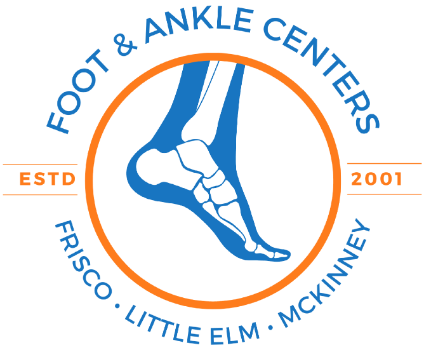Expert Foot Wound Care to Prevent Complications | Foot & Ankle Centers
Sep 25, 2025 | By: Foot & Ankle Centers of Frisco, Little Elm, McKinney
Foot wounds may seem like a minor issue, but if left untreated, they can lead to serious complications like infection or even amputation. Whether it’s a simple cut, a blister, or a chronic wound, proper care is essential to ensure healing and prevent further problems. This is especially true for individuals with diabetes, poor circulation, or other health conditions that affect the body’s ability to heal.
Why Foot Wounds Need Prompt Attention
Foot wounds are especially vulnerable to infection, as the feet are often exposed to dirt, moisture, and friction. If left untreated, a seemingly small wound can develop into a larger, more complicated issue.
Foot wounds can lead to:
-
Infections: Bacterial infections like cellulitis or osteomyelitis (bone infection) can spread quickly if not treated.
-
Chronic Ulcers: These are open sores that can persist for weeks or months and may require specialized care to heal properly.
-
Amputation: In severe cases, untreated wounds, particularly in diabetic patients, can lead to gangrene, which may require partial or complete amputation.
For individuals with diabetes or poor circulation, the body’s ability to heal is significantly reduced, which makes early intervention even more critical. Regular monitoring and timely treatment, with our doctors at Foot & Ankle Centers, can prevent infections and other serious complications.
The Role of Early Care in Preventing Foot Complications
Early intervention is critical to avoiding severe complications.
Here’s are some tips for managing foot wounds from Foot & Ankle Centers:
-
Clean the wound with antiseptic. This reduces the risk of bacteria entering the wound.
-
Cover it with a sterile bandage or dressing to protect the wound from dirt and moisture.
-
Monitor the wound daily for signs of infection, such as increased redness, swelling, or pus.
-
Seek professional help if the wound does not improve after a few days or if there are signs of infection.
At Foot & Ankle Centers in Frisco, Little Elm, and McKinney, our skilled podiatrists, Dr. Tavakoli, Dr. Knapp, and Dr. Treleven, are dedicated to preventing infections, supporting the healing process, and minimizing the risk of severe complications from foot wounds. In this post, we'll explore why prompt attention to foot wounds is crucial, the importance of early care in preventing further issues, and how our expert team can assist in your recovery
Common Foot Wounds and How to Prevent Complications
Let’s look at some common foot wounds and how to manage them to prevent complications:
Diabetic Foot Ulcers
-
Symptoms: Open sores or ulcers on the feet, especially on the bottom or heels.
-
Prevention: Daily foot inspections, wearing proper footwear, keeping feet dry, and managing blood sugar levels.
-
Treatment: Early intervention is key. If a wound doesn’t heal with conservative treatment, advanced care like debridement or infection control may be necessary.
Blisters and Calluses
-
Symptoms: Fluid-filled bumps that form due to friction or pressure.
-
Prevention: Properly fitting shoes, using blister pads, and avoiding long periods of pressure on one part of the foot.
-
Treatment: Clean the area, avoid popping blisters, and apply a sterile bandage. Monitor for signs of infection.
Cuts and Scrapes
-
Symptoms: Minor cuts or abrasions on the feet.
-
Prevention: Clean wounds immediately, wear protective shoes, and avoid walking barefoot in risky environments.
-
Treatment: Clean with antiseptic and cover with a bandage. Watch for signs of infection, like increased redness or swelling.
Ingrown Toenails
-
Symptoms: Pain, swelling, and redness at the edge of the toenail.
-
Prevention: Trim nails straight across to avoid them digging into the skin, and avoid tight shoes that apply pressure to the toes.
-
Treatment: Soaking the foot in warm water, using over-the-counter pain relievers, and seeking professional help if the nail becomes infected.
Advanced Wound Care at Foot & Ankle Centers
At Foot & Ankle Centers, we offer specialized wound care treatments for faster, more effective healing, such as:
-
Wound Debridement: Removal of dead tissue from the wound bed to promote healing.
-
Topical Treatments: Specialized ointments or dressings that encourage faster recovery and reduce infection risk.
-
Pressure Offloading: Custom orthotics or specialized footwear to relieve pressure on the wound and encourage healing.
-
Infection Prevention: Antibacterial treatments or oral antibiotics to prevent infections from spreading.
-
Chronic Wound Management: For wounds that won’t heal on their own, we offer advanced therapies like growth factor treatments or skin grafts.
These treatments are designed to help heal wounds faster, prevent complications, and improve overall foot health.
When to Seek Professional Help
While many minor foot wounds can be treated at home, it's important to seek professional care if you notice any of the following:
-
The wound doesn’t heal within a few days.
-
There are signs of infection (e.g., redness, warmth, swelling, or pus).
-
You have diabetes or other health conditions that affect circulation or immunity.
-
The wound is large, deep, or located in a high-pressure area (like the bottom of your foot).
-
You experience significant pain or discomfort.
Ignoring a foot wound or delaying treatment can lead to more serious complications, so it’s important to act quickly.
Book Your Wound Care Consultation Today
If you have a foot wound, or if you’re concerned about your foot health, don’t wait to get care. Early intervention is the key to avoiding serious complications. Our team at Foot & Ankle Centers is here to guide you through wound care and ensure your feet remain healthy.
Book an appointment online at our locations in Frisco, Little Elm, or McKinney or give us a call (972) 712-7773. Taking the right steps early can prevent infections, promote healing, and keep your feet healthy. Let Dr. Tavakoli, Dr. Knapp, or Dr. Treleven help you stay one step ahead in your journey to better foot health.


Leave a comment
0 Comments